On November 23, 2024, the "Research on the Border Governance System in Promoting the Construction of the Chinese National Community" forum was successfully held in Room 201, Science Building No.5, Peking University. The event was organized by the Department of Sociology, Peking University; the Center for Chinese Society and Development Studies, Peking University; and the Research Base for Strengthening the Awareness of the Chinese National Community, Peking University. It was co-organized by the Law School of Shihezi University and the School of Social and Public Management, East China University of Science and Technology.
The opening ceremony of the conference was chaired by Professor Zhou Feizhou, the head of the Department of Sociology at Peking University. He introduced the attending experts and scholars and welcomed the guests to the event.
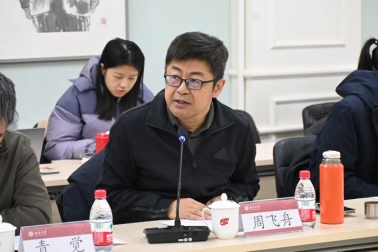
Prof. Zhou Feizhou Delivering Speech
In his speech, professor Zhou Feizhou introduced the origin of the cooperation between the three schools. He pointed out that the current ethnic research should combine border governance with urban and rural development and other issues, and consolidate the social foundation for forging the sense of community of the Chinese nation. Professor He Xuesong, dean of the School of Social and Public Administration of East China University of Science and Technology, pointed out that the mainland and the border areas are interdependent, and expressed his strong support for the cooperation with Peking University and Shihezi University.
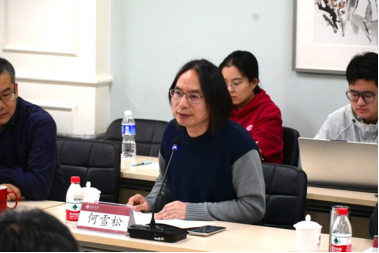
Prof. He Xuesong Delivering Speech
After the speech, all attendees joined together for a group photo.
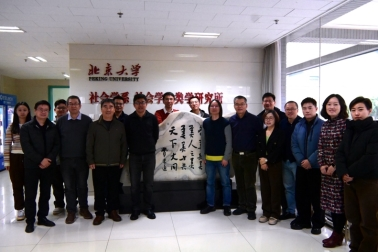
Forum Attendees Group Photo
The first discussion in the morning was facilitated by He Xuesong, professor and dean of the School of Social and Public Administration, East China University of Science and Technology. Wang Tianfu, dean of the School of Social Sciences and professor of Sociology, Tsinghua University, first addressed "Thoughts on Social Governance in the Frontier Areas in the Digital Era". The border society has the characteristics of far away from the mainland, large and sparsely populated, unbalanced distribution of resources and public affairs with local characteristics. Frontier social governance in the digital age should improve the capacity and efficiency of information dissemination, promote social mobilization and precise provision of services, and prevent the negative impact of the digital divide.
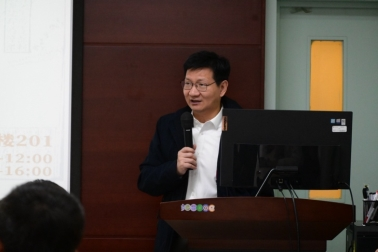
Prof. Wang Tianfu Presenting
Professor Sun Xiulin, deputy dean of the School of Social Sciences of Tsinghua University and deputy director of the Department of Sociology, delivered a speech entitled "Zhao Quan Xiaochuan: Frontier Society and Life in the 16th Century". The Ming court and Mongolian officials in the Long Qing Dynasty mentioned Zhao Quan many times, who has the identity of a white lotus religion, a fugitive, leading the way, and a disseminator of civilization. The sociological writing of historical figures has opened up the ideas of social history, civilization and national community construction, and also inspired the modern border governance.
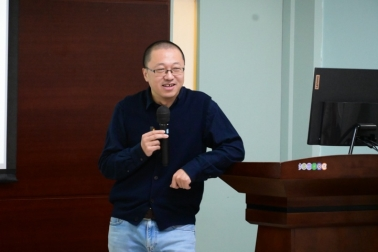
Prof. Sun Xiulin Presenting
Yuan Jian, a professor at the School of Ethnology and Sociology, Minzu University of China, presented his study on The Practice of Border Governance: The Historical tradition and Contemporary Value of the Relations among Border Regions in the Qing Dynasty. The Qing court's series of system design and governance practices in the border areas consolidated the structure of "unified ring" based on geography and crowd base, as well as the concept logic of "unification of the world". The correlation and similarity of historical scenes and contemporary geoscenes provide a model for the realistic situation of frontier governance.
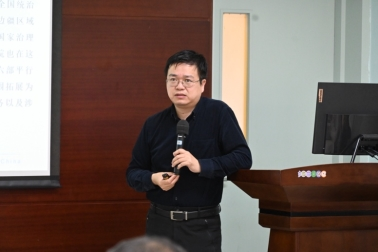
Prof. Yuanjian Presenting
Chen Jianyue, Director of the Ethnic Theory Department and Researcher at the Institute of Ethnology and Anthropology, Chinese Academy of Social Sciences, delivered a speech titled "The Historical Experience of the Chinese Communist Party in Handling Ethnic Issues in the Early Period of New China." The establishment of the new ethnic policy discourse system in New China is based on the Party's re-construction of the historical context of a multi-ethnic state. The "three conferences" on trade, health, and education for ethnic minorities in 1951 were all aimed at "alleviating the suffering of ethnic groups in border areas." Subsequent major inspections of ethnic policies were intended to clear the remnants of erroneous thoughts of "two forms of nationalism." In 1954, the ethnic policy discourse system was officially incorporated into the constitution. In the new era, border governance requires a review of the "changes and constants" in the discourse of ethnic policies.
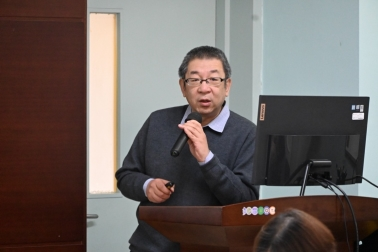
Prof. Chen Jianyue Presenting
After a short break, the second discussion began in the morning, presided over by Li Jianxin, professor of sociology at Peking University.
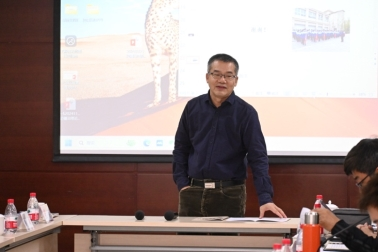
Prof. Li Jianxin Hosting the Forum
He Xuesong, Dean and Professor at the School of Social and Public Management, East China University of Science and Technology, gave a presentation titled "Paired Development under the National System." As part of the national system, "pairing" is reflected at the central level through transfer payments, policy inclinations, and cadre exchanges, while between local governments it takes the form of counterpart support, targeted assistance, and east-west collaboration. Combining specific cases of community governance and social work stations, Professor He pointed out the three levels of paired development—institutional guidance, technological output, and emotional bonding. Paired development is both a mechanism for shared prosperity and ethnic unity and a dynamic mechanism for the new sociology of development.
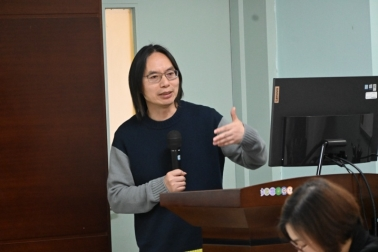
Prof. He Xuesong Presenting
Wang Juan, Associate Professor at the Department of Sociology, Peking University, and Deputy Director of the Research Base for Strengthening the Awareness of the Chinese National Community at Peking University, presented her research titled "Agricultural Modernization West of the Hu Huanyong Line." The region west of the Hu Huanyong Line has limited agricultural conditions and does not possess the "over-intensive" characteristics of the North China Plain and the middle and lower reaches of the Yangtze River Plain. However, it has become a major production area for vegetables in China during the summer and autumn seasons. This pattern breaks the stereotypes of agricultural development and provides a practical basis for the development of new local systems in border regions.
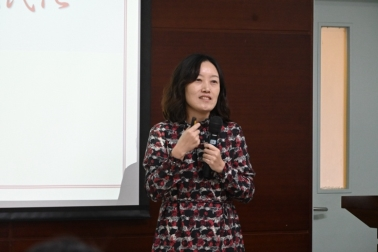
Prof. Wang Juan Presenting
Associate Professor Ye Xiaoqin from the Law School at Shihezi University and a member of the Research Center for Strengthening the Awareness of the Chinese National Community at Shihezi University presented her research titled "The Construction and Application of the Quantitative Indicator System for the Corps Spirit from the Perspective of Strengthening the Awareness of the Chinese National Community." The challenge in inheriting the Corps Spirit lies in its abstract nature; therefore, when constructing a quantitative indicator system, it is necessary to integrate three dimensions: cognition, emotion, and behavioral tendencies. Additionally, the application should be diversified in terms of practical groups and key application venues.
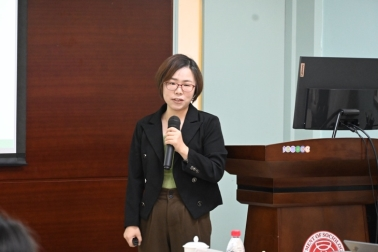
Prof. Ye Xiaoqin Presenting
Zhang Zhe, Assistant Professor at the Department of Sociology, Peking University, and a full-time researcher at the Research Base for Strengthening the Awareness of the Chinese National Community at Peking University, made a presentation titled "Ethnic Minority Education in Different Locations and the Identity of the Chinese National Community: The Case of Xinjiang High School Classes in Inland China." He found that the ethnic identification of students in the Xinjiang classes in inland China is positively correlated with national identification, and there are no significant differences in identification among different ethnic groups. Since the new century, the ethnic identification of Uyghur students in the inland high school classes has gone through three stages of change: a relatively secular ethnic identification, an ethnic identification with religious conservatism at its core, and an ethnic identification that is in harmony with the identification of the Chinese National Community.
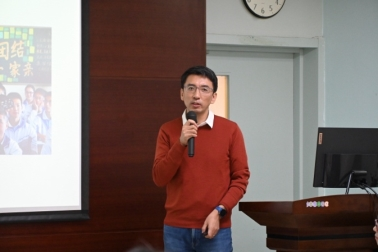
Prof. Zhang Zhe Presenting
After the second session of speeches, the attending scholars engaged in a lively discussion about the research presented by the eight speakers in the morning.
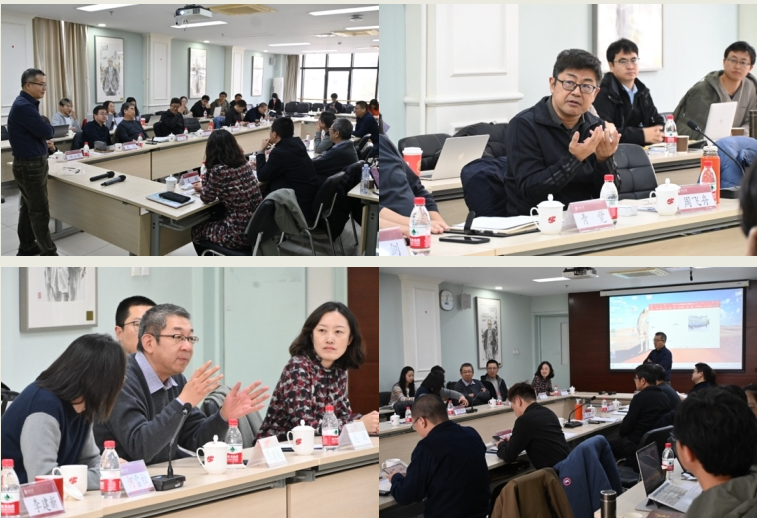
The afternoon discussion was facilitated by Wang Juan, Associate Professor at the Department of Sociology, Peking University.
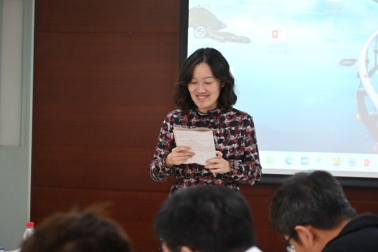
Prof. Wang Juan Facilitating the Afternoon Discussion
Professor Li Jianxin from the Department of Sociology at Peking University and a full-time researcher at the Research Base for Strengthening the Awareness of the Chinese National Community at Peking University, gave a speech titled "Population Characteristics and Social Governance in Land Border Areas." The population characteristics of land border areas are negative growth, aging, gender ratio imbalance, and a high number of mobile populations, which bring development risks and security threats. Therefore, population governance in land border areas should establish a holistic national security perspective, promote high-quality economic development, improve the policy system for family support, and perfect the coordination mechanism for peripheral security work.
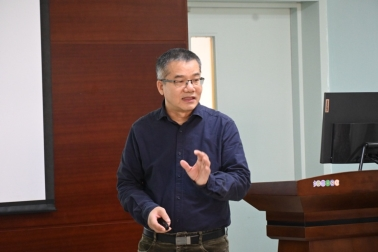
Prof. Li Jianxin Presenting
Associate Professor Zhao Min from the Law School at Shihezi University and a member of the Research Center for Strengthening the Awareness of the Chinese National Community at Shihezi University presented a report titled "The Current Status and Characteristics of Population Mobility and Integration in the Xinjiang Corps' Cross-Province Border Consolidation and Stability Programs." The research is based on the context of cross-province border consolidation and stability resettlement communities, describing the economic, behavioral adaptation, identity recognition, and residential intention of the population mobility and integration, and analyzing the influencing factors of integration intention.
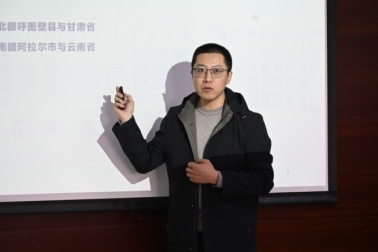
Prof. Zhao Min Presenting
Associate Professor Qu Rongcheng from the School of Economics and Management at Shihezi University and Deputy Director of the Research Center for Strengthening the Awareness of the Chinese National Community at Shihezi University delivered a speech titled "The Dilemma and Approaches to Building an Embedded Social Structure in Southern Xinjiang Rural Areas." The inter-ethnic embedded social structure has its own mechanisms for self-organization and self-evolution, which require coordinated efforts in aspects such as geographical spatial isolation, language communication barriers, population structure imbalances, and control by extreme religions.
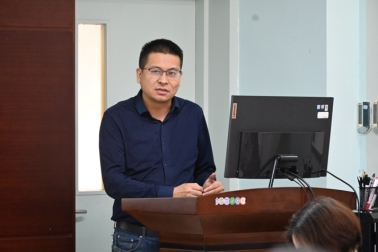
Prof. Qu Rongcheng Presenting
Finally, Professor Duan Wenjie from the School of Social and Public Management at East China University of Science and Technology presented a speech titled "Conceptualization of Grassroots Governance Effectiveness: Systematic Review and Thematic Analysis." Drawing on the perspective of interface governance, Professor Duan analyzed the conceptual meaning of "grassroots governance effectiveness" at four levels: interface, internal structure, functions and objectives, and external environment. Strengthening interface functions and objectives, optimizing internal structure, enhancing environmental adaptation, and constructing multi-level governance interfaces are the approaches to improving grassroots governance effectiveness.
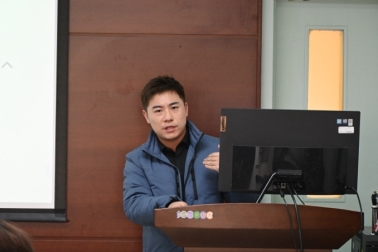
Prof. Duan Wenjie Presenting
During the Q&A and discussion session, participants and teachers engaged in in-depth discussions on topics such as population integration in border areas and border development.
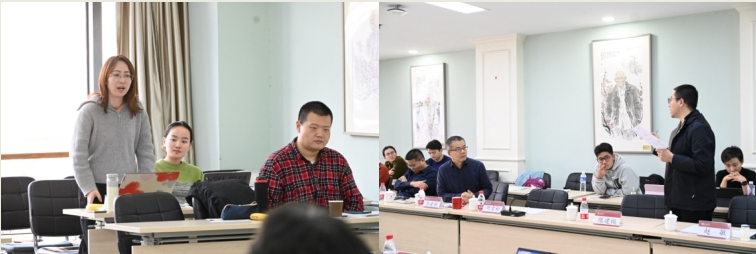
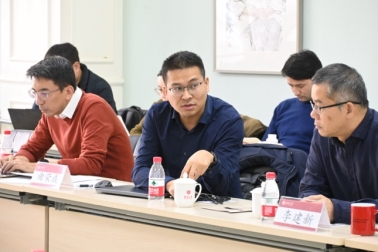
Finally, Zhou Feizhou, the Chair and professor of the Department of Sociology at Peking University, gave the concluding remarks and expressed his hope to continue hosting the next forum next year.